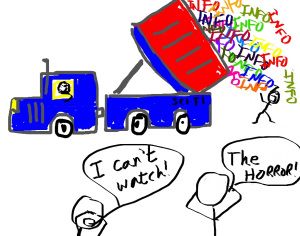Trap #2 - Info Dumping

Newer authors are often afraid that readers miss out on the plot if they don't know from the start about every character, their backgrounds and the world around them. It's the number one mistake I made. Exposition (or info dumping) can kill a plot and put the reader to sleep. My first dystopian novel Changing Time was full of it.
Example of Changing Time:
The Great War began over a dispute of the world's natural oil resources. The oil countries, called the Middle East in the Old World, closed its production to the industrial world, trying to blackmail those countries to meet its demand for political power and influence.
The plan backfired. The industrial countries retaliated, first in unison against a handful of small countries, after that, they turned against each other.
The war that followed was devastating. There was no place anyone could hide and the war wiped out almost forty percent of the world's population. The countries were smart enough to avoid total destructing by not using their nuclear weapons but the fire bombs used destroyed enough. Cities, fields, and most of all, the South American Rain Forest.
Nature didn't take kindly to the war and fought back. Global warming caused storms, earthquakes and tsunamis, resulting in more death and destruction, and the human race was forced to withdraw to a few places spared by the war and nature's fight against mankind. After only a little more than two years, the world they once knew was gone - there was only a fraction of people left and most of the earth had succumbed to wasteland.
Yawning yet? Well, now picture this going on for seven more pages. It was info-dumping at its finest and if I had ever published this story, I doubt anyone would have made it past chapter five.
The way to introduce backstory is slowly by filtering it in naturally while the readers are immersed in scenes that have action and conflict. This takes skill and most of all, practice. You have time. If the reader has all of the necessary background information by the time of the big show-down, you are all set. Allow the reader to get to know your characters and their world. It's part of the reading enjoyment, and dumping it all on them in one go is not only a plot killer, but takes away a lot of the suspense and plot development.
Another thing to avoid are "As you are aware, Harold..." type of dialogue. Introducing backstory through a conversation is generally not a bad idea, if, and only if, that person isn't familiar with your character and eager to learn more about them. You don't tell your dad your life story over Christmas dinner. He already knows. Putting this stuff in dialogue insults the readers, since nobody would say this stuff in real life.
Example:
"As you know, Dad, I just recently crashed your car and broke my arm. Here, I even still have the cast."
Do I need to say more?
One technique I favor is introducing backstory through flashbacks or a prologue which allows the reader to experience a key scene which impacts the plot later on. It is not something I can recommend for new authors since transitions can get lost and flashbacks can tear the reader out of the flow of the current plot string. Some readers hate it and wouldn't touch the book because of it. It's a risk I'm aware of (and you should, too, if you ever decide to go this route), but I have chosen this purposely as my individual style because I have always enjoyed books that actively offered me a glimpse into the past instead of developing that part of the backstory within the plot. Living With The Choices We Make jumps constantly between the present and the past and this particular style is favored by a lot of readers who love the series, but giving away the ending, like I did, can backfire. It is also a technique you might want to hold off on until you have already some writing experience.
Bạn đang đọc truyện trên: AzTruyen.Top